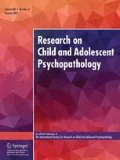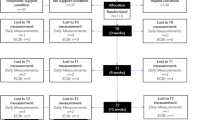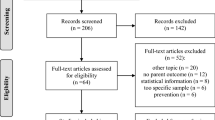Abstract
Parent training (PT) delivered as a guided self-help intervention may be a cost- and time-effective intervention in the treatment of children with externalizing disorders. In face-to-face PT, parenting strategies have repeatedly been identified as mediating mechanisms for the decrease of children’s problem behavior. Few studies have examined possible mediating effects in guided self-help interventions for parents. The present study aimed to investigate possible mediating variables of a behaviorally oriented guided self-help program for parents of children with externalizing problems compared to a nondirective intervention in a clinical sample. A sample of 110 parents of children with externalizing disorders (80 % boys) were randomized to either a behaviorally oriented or a nondirective guided self-help program. Four putative mediating variables were examined simultaneously in a multiple mediation model using structural equation modelling. The outcomes were child symptoms of ADHD and ODD as well as child externalizing problems, assessed at posttreatment. Analyses showed a significant indirect effect for dysfunctional parental attributions in favor of the group receiving the behavioral program, and significant effects of the behavioral program on positive and negative parenting and parental self-efficacy, compared to the nondirective intervention. Our results indicate that a decrease of dysfunctional parental attributions leads to a decrease of child externalizing problems when parents take part in a behaviorally oriented guided self-help program. However, none of the putative mediating variables could explain the decrease in child externalizing behavior problems in the nondirective group. A change in dysfunctional parental attributions should be considered as a possible mediator in the context of PT.




Similar content being viewed by others
References
American Psychiatric Association (2000). Diagnostic and statistical manual of mental disorders (4th ed.). Washington, DC: American Psychiatric Association.
American Psychiatric Association (2013). Diagnostic and statistical manual of mental disorders (5th ed.). Washington, DC: American Psychiatric Association.
Arbeitsgruppe Deutsche Child Behavior Checklist (1998). Elternfragebogen über das Verhalten von Kindern und Jugendlichen; deutsche Bearbeitung der child behavior checklist (CBCL/4–18). In Köln: Arbeitsgruppe kinder-. Jugend- und: Familiendiagnostik (KJFD).
Beauchaine, T. P., Webster-Stratton, C., & Reid, M. J. (2005). Mediators, moderators, and predictors of 1-year outcomes among children treated for early-onset conduct problems: a latent growth curve analysis. Journal of Consulting and Clinical Psychology, 73, 371–388.
Bugental, D. B., Crane Ellerson, P., Lin, E. K., Rainey, B., Kokotovic, A., & O’Hara, N. (2002). A cognitive approach to child abuse prevention. Journal of Family Psychology, 16, 243–258.
Carter, A. (2010). Prevalence of DSM-IV disorder in a representative, healthy birth cohort at school entry: sociodemographic risks and social adaption. Journal of the American Academy of Child and Adolescent Psychiatry, 49, 686–698.
Cedar, B., & Levant, R. F. (1990). A meta-analysis of the effects of parent effectiveness training. The American Journal of Family Therapy, 18, 373–384.
Corcoran, J., & Dattalo, P. (2006). Parent involvement in treatment for ADHD: a meta-analysis of the published studies. Research on Social Work Practice, 16, 561–570.
Daley, D., & O’Brien, M. (2013). A small-scale randomized controlled trial of the self-help version of the new forest parent training programme for children with ADHD symptoms. European Child and Adolescent Psychiatry, 22, 542–552.
de Graaf, I., Speetjens, P., Smit, F., de Wolff, M., & Tavecchio, L. (2008). Effectiveness of the triple P positive parenting program on parenting: a meta-analysis. Family Relations, 57, 553–566.
Dekovic, M., Asscher, J. J., Hermanns, J., Reitz, E., Prinzie, P., & van den Akker, A. L. (2010). Tracing changes in families who participated in the home-start parenting program: parental sense of competence as mechanism of change. Prevention Science, 11, 263–274.
Döpfner, M., Görtz-Dorten, A., & Lehmkuhl, G. (2008). Diagnostik-system für psychische Störungen im Kindes- und Jugendalter nach ICD-10 und DSM-IV, DISYPS-II. Bern: Huber.
Döpfner, M., Schürmann, S., & Lehmkuhl, G. (2011). Wackelpeter und Trotzkopf: Hilfen für Eltern bei ADHS-Symptomen, hyperkinetischem und oppositionellem Verhalten (4. Aufl ed.). Weinheim: Beltz.
Elgar, F. J., & McGrath, P. J. (2003). Self-administered psychosocial treatments for children and families. Journal of Clinical Psychology, 59, 321–339.
Enders, C. K. (2001). The performance of the full information maximum likelihood estimator in multiple regression models with missing data. Educational and Psychological Measurement, 61, 713–740.
Enebrink, P., Högström, J., Forster, M., & Ghaderi, A. (2012). Internet-based parent management training: a randomized controlled study. Behaviour Research and Therapy, 50, 240–249.
Eyberg, S. M., Nelson, M. M., & Boggs, S. R. (2008). Evidence-based psychosocial treatments for children and adolescents with disruptive behavior. Journal of Clinical Child & Adolescent Psychology, 37, 215–237.
Fabiano, G. A., Pelham Jr., W. E., Coles, E. K., Gnagy, E. M., Chronis-Tuscano, A., & O’Connor, B. C. (2009). A meta-analysis of behavioral treatments for attention-deficit/hyperactivity disorder. Clinical Psychology Review, 29, 129–140.
Farmer, E. M. Z., Compton, S. N., Burns, J. B., & Robertson, E. (2002). Review of the evidence base for treatment of childhood psychopathology: externalizing disorders. Journal of Consulting and Clinical Psychology, 70, 1267–1302.
Fossum, S., Morch, W.-T., Handegard, B. H., Drugli, M. B., & Larsson, B. (2009). Parent training for young norwegian children with ODD and CD problems: predictors and mediators of treatment outcome. Scandinavian Journal of Psychology, 50, 173–181.
Gardner, F., Burton, J., & Klimes, I. (2006). Randomised controlled trial of a parenting intervention in the voluntary sector for reducing child conduct problems: outcomes and mechanisms of change. Journal of Child Psychology and Psychiatry, 47, 1123–1132.
Gardner, F., Hutchings, J., Bywater, T., & Whitaker, C. (2010). Who benefits and how does it work? Moderators and mediators of outcome in an effectiveness trial of a parenting intervention. Journal of Clinical Child & Adolescent Psychology, 39, 568–580.
Glasgow, R. E., & Rosen, G. M. (1978). Behavioral bibliotherapy: a review of self-help behavior therapy manuals. Psychological Bulletin, 85, 1–23.
Gordon, T. (1970). P. E. T. Parent effectiveness training: the tested new way. Philadelphia: David McKay Company.
Hagen, K. A., Ogden, T., & Bjornebekk, G. (2011). Treatment outcomes and mediators of parent management training: a one-year follow-up of children with conduct problems. Journal of Clinical Child & Adolescent Psychology, 40, 165–178.
Halligan, S. L., Cooper, P. J., Healy, S. J., & Murray, L. (2007). The attribution of hostile intent in mothers, fathers and their children. Journal of Abnormal Child Psychology, 35, 594–604.
Hanisch, C., Hautmann, C., Plück, J., Eichelberger, I., & Döpfner, M. (2014). The prevention program for externalizing problem behavior (PEP) improves child behavior by reducing negative parenting: analysis of mediating processes in a randomized controlled trial. Journal of Child Psychology and Psychiatry, 55, 473–484.
Hautmann, C., & Döpfner, M. (2015). Comparison of behavioral and non-directive guided self-help for parents of children with externalizing behavior problems. European Child & Adolescent Psychiatry, 24(Suppl. I), 17.
Hayes, A. F. (2013). Introduction to mediation, moderation, and conditional process analysis: a regression-based approach. New York: The Guilford Press.
Hektner, J. M., August, G. J., Bloomquist, M. L., Lee, S., & Klimes-Dougan, B. (2014). A 10-year randomized controlled trial of the early risers conduct problems preventive intervention: effects on externalizing and internalizing in late high school. Journal of Consulting and Clinical Psychology, 82, 355–360.
Imort, S., Hautmann, C., Greimel, L., Katzmann, J., Pinior, J., Scholz, K., & Döpfner, M. (2014, May). Der Fragebogen zum positiven und negativen Erziehungsverhalten (FPNE): eine psychometrische Zwischenanalyse. In Poster zum 32. Symposium der Fachgruppe Klinische Psychologie und Psychotherapie der: DGPs, Braunschweig, Germany.
Ise, E., Kierfeld, F., & Döpfner, M. (2014). One-year follow-up of guided self-help for parents of preschool children with externalizing behavior. Journal of Primary Prevention, 36, 33–40.
Jensen, P. S., Weersing, R., Hoagwood, K. E., & Goldman, E. (2005). What is the evidence for evidence-based treatments? A hard look at our soft underbelly. Mental Health Services Research, 7, 53–74.
Johnston, C., Hommersen, P., & Seipp, C. M. (2009). Maternal attributions and child oppositional behavior: a longitudinal study of boys with and without attention-deficit/hyperactivity disorder. Journal of Consulting and Clinical Psychology, 77, 189–195.
Johnston, C., & Ohan, J. L. (2005). The importance of parental attributions in families of children with attention-deficit/hyperactivity and disruptive behavior disorders. Clinical Child and Family Psychology Review, 8, 167–182.
Kaminski, J. W., Valle, L. A., Filene, J. H., & Boyle, C. L. (2008). A meta-analytic review of components associated with parent training program effectiveness. Journal of Abnormal Child Psychology, 36, 567–589.
Katzmann, J., Hautmann, C., Greimel, L., Imort, S., Pinior, J., Scholz, K., & Döpfner, M. (2015). Dysfunktionale Attributionen von Eltern und ihre Bedeutung für ihr Erziehungsverhalten und für expansives Problemverhalten von Kindern – eine psychometrische Überprüfung und Anwendung der deutschen Fassung des Fragebogens zu dysfunktionalen elterlichen Attributionen (FDEA). Zeitschrift für Klinische Psychologie und Psychotherapie, 44, 266–271.
Kierfeld, F., Ise, E., Hanisch, C., Görtz-Dorten, A., & Döpfner, M. (2013). Effectiveness of telephone-assisted parent-administered behavioural family intervention for preschool children with externalizing problem behaviour: a randomized controlled trial. European Child and Adolescent Psychiatry, 22, 553–565.
Kling, Å., Forster, M., Sundell, K., & Melin, L. (2010). A randomized controlled effectiveness trial of parent management training with varying degrees of therapist support. Behavior Therapy, 41, 530–542.
Kraemer, H. C., Wilson, G. T., Fairburn, C. G., & Agras, W. S. (2002). Mediators and moderators of treatment effects in randomized clinical trials. Archives of General Psychiatry, 59, 877–883.
Lavigne, J. V., Lebailly, S. A., Gouze, K. R., Cicchetti, C., Pochyly, J., Arend, R., et al. (2008). Treating oppositional defiant disorder in primary care: a comparison of three models. Journal of Pediatric Psychology, 33, 449–461.
Lundahl, B., Risser, H. J., & Lovejoy, M. C. (2006). A meta-analysis of parent training: moderators and follow-up effects. Clinical Psychology Review, 26, 86–104.
Markie-Dadds, C., & Sanders, M. R. (2006). A controlled evaluation of an enhanced self-directed behavioural family intervention for parents of children with conduct problems in rural and remote areas. Behaviour Change, 23, 55–72.
McGrath, P. J., Lingley-Pottie, P., Thurston, C., MacLean, C., Cunningham, C., Waschbusch, D. A., et al. (2011). Telephone-based mental health interventions for child disruptive behavior or anxiety disorders: randomized trials and overall analysis. Journal of the American Academy of Child and Adolescent Psychiatry, 50, 1162–1172.
McTaggart, P., & Sanders, M. R. (2007). Mediators and moderators of change in dysfunctional parenting in a school-based universal application of the triple-P positive parenting programme. Journal of Children’s Services, 2, 4–17.
Mohr, D. C., Hart, S. L., Julian, L., Catledge, C., Honos-Webb, L., Vella, L., & Tasch, E. T. (2005). Telephone-administered psychotherapy for depression. Archives of General Psychiatry, 62, 1007–1014.
Mokros, L., Benien, N., Mütsch, A., Kinnen, C., Schürmann, S., Metternich-Kaizman, T. W., et al. (2015). Angeleitete Selbsthilfe für Eltern von Kindern mit Aufmerksamkeitsdefizit−/Hyperaktivitätsstörung: Konzept, Inanspruchnahme und Effekte eines bundesweiten Angebotes – eine Beobachtungsstudie. Zeitschrift für Kinder- und Jugendpsychiatrie und Psychotherapie, 43, 275–288.
Montes, M. P., de Paúl, J., & Milner, J. S. (2001). Evaluations, attributions, affect, and disciplinary choices in mothers at high and low risk for child physical abuse. Child Abuse & Neglect, 25, 1015–1036.
Montgomery, P., Bjornstad, G. J., & Dennis, J. A. (2006). Media-based behavioural treatments for behavioural problems in children. Cochrane Database of Systematic Reviews, 2006(1), 1–44. doi:10.1002/14651858.cd002206.pub3.
Morrissey-Kane, E., & Prinz, R. J. (1999). Engagement in child and adolescent treatment: the role of parental cognitions and attributions. Clinical Child and Family Psychology Review, 2, 183–198.
Muthén, L. K., & Muthén, B. O. (2012). Mplus (version 7.0) [computer software]. Los Angeles: Muthén & Muthén.
Naumann, S., Kuschel, A., Bertram, H., Heinrichs, N., & Hahlweg, K. (2007). Förderung der Elternkompetenz durch triple P-Elterntrainings. Praxis der Kinderpsychologie und Kinderpsychiatrie, 56, 676–690.
Nieuwboer, C. C., Ruben, G. F., & Hermanns, J. M. A. (2013). Online programs as tools to improve parenting: a meta-analytic review. Children and Youth Services Review, 35, 1823–1829.
Nix, R. L., Pinderhughes, E. E., Dodge, K. A., Bates, J. E., Pettit, G. S., & McFadyen-Ketchum, S. A. (1999). The relation between mothers’ hostile attribution tendencies and children’s externalizing behavior problems: the mediating role of mothers’ harsh discipline practices. Child Development, 70, 896–909.
O’Brien, M., & Daley, D. (2011). Self-help parenting interventions for childhood behaviour disorders: a review of the evidence. Child: Care, Health & Development, 37, 623–637.
Perepletchikova, F., & Kazdin, A. E. (2004). Assessment of parenting practices related to conduct problems: development and validation of the management of children’s behavior scale. Journal of Child and Family Studies, 13, 385–403.
Preacher, K. J., & Hayes, A. F. (2008). Asymptotic and resampling strategies for assessing and comparing indirect effects in multiple mediator models. Behavior Research Methods, 40, 879–891.
Reid, G. J., Stewart, M., Vingilis, E., Dozois, D. J., Wetmore, S., Jordan, J., et al. (2013). Randomized trial of distance-based treatment for young children with discipline problems seen in primary health care. Family Practice, 30, 14–24.
Rucker, D. D., Preacher, K. J., Tormala, Z. L., & Petty, R. E. (2011). Mediation analysis in social psychology: current practices and new recommendations. Social and Personality Psychology Compass, 5, 359–371.
Snarr, J. D., Smith Slep, A. M., & Grande, V. P. (2009). Validation of a new self-report measure of parental attributions. Psychological Assessment, 21, 390–401.
Tarver, J., Daley, D., Lockwood, J., & Sayal, K. (2014). Are self-directed parenting interventions sufficient for externalising behaviour problems in childhood? A systematic review and meta-analysis. European Child and Adolescent Psychiatry, 23, 1123–1137.
Thomas, R., & Zimmer-Gembeck, M. J. (2007). Behavioral outcomes of parent-child interaction therapy and triple P–positive parenting program: a review and meta-analysis. Journal of Abnormal Child Psychology, 35, 475–495.
Whisman, M. A. (1993). Mediators and moderators of change in cognitive therapy of depression. Psychological Bulletin, 114, 248–265.
Wilson, C., Gardner, F., Burton, J., & Leung, S. (2006). Maternal attributions and young children’s conduct problems: a longitudinal study. Infant and Child Development, 15, 109–121.
Yu, C.-Y. (2002). Evaluating cutoff criteria of model fit indices for latent variable models with binary and continuous outcomes. University of California, Los Angeles: Unpublished manuscript.
Author information
Authors and Affiliations
Corresponding author
Ethics declarations
Funding
This study was funded by Deutsche Forschungsgemeinschaft (DFG; German Research Foundation) (grant number DO 620/5–1).
Conflict of Interest
Josepha Katzmann, Christopher Hautmann, Stephanie Imort, Julia Pinior, Kristin Scholz and Manfred Döpfner are authors of the parent booklets used in the behavioral intervention of this study. Manfred Döpfner received income as Head of the School for Child and Adolescent Behavior Therapy at the University of Cologne and royalties from treatment manuals, books and psychological tests published by Guilford, Hogrefe, Enke, Beltz, and Huber. Lisa Greimel declares that she has no conflict of interest.
Ethical Approval
The study was approved by the ethics committee of the University Hospital of Cologne (ref: 09–123).
Human and Animal Rights
All procedures performed in studies involving human participants were in accordance with the ethical standards of the institutional and/or national research committee and with the 1964 Helsinki declaration and its later amendments or comparable ethical standards. This article does not contain any studies with animals performed by any of the authors.
Informed Consent
Informed consent was obtained from all individual participants included in the study.
Rights and permissions
About this article
Cite this article
Katzmann, J., Hautmann, C., Greimel, L. et al. Behavioral and Nondirective Guided Self-Help for Parents of Children with Externalizing Behavior: Mediating Mechanisms in a Head-To-Head Comparison. J Abnorm Child Psychol 45, 719–730 (2017). https://doi.org/10.1007/s10802-016-0195-z
Published:
Issue Date:
DOI: https://doi.org/10.1007/s10802-016-0195-z




